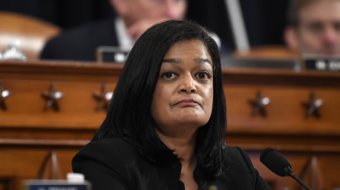
Between growing momentum for impeachment, court fights over congressional subpoenas, and a score of Democratic Party presidential hopefuls lay this year’s five important state elections. New Jersey’s General Assembly (state house), Virginia’s house and senate, Louisiana and Mississippi’s house, senate, and governor races, and Kentucky’s governorship are all on the ballots.
In many of these elections voter suppression measures, including mass incarceration, gerrymandering, and restrictive voting laws, will affect outcomes.
New Jersey’s Democrats hold a “trifecta,” handily controlling the senate and house as well as the governorship. Republicans do likewise in Kentucky and Mississippi, but, as we will see, the outcome is vastly different. This is all-important: with trifectas, there is no stopping the legislative and electoral agenda of the party in power.
If the results are progressive reforms, great, but if they comprise backward movements on democracy and policy, the liberal and progressive reformers of each state face enormous challenges. The people’s movements may continue, but without connections to lawmaking, they are in danger of becoming just observers rather than policy makers.se are ultimately observers.
With Democratic Gov. Ralph Northam—the one with the racist photo on his medical school yearbook page—Virginia’s Republicans maintain divided government with razor-thin margins of only two votes in both the house and senate. Louisiana also has a divided government: a Democratic governor, Gov. John Bell Edwards, and a Republican-majority legislature of both houses.

Of these five states, Sec. Hillary Clinton did by far the best in New Jersey, though she also won solidly in Virginia. President Trump, however, crushed her in Louisiana, Kentucky, and Mississippi. In Mississippi and Louisiana, the presidential vote mirrored the racial and ethnic composition of each state.

New Jersey’s incarceration rate is far below the average rate of the country. The four other states are above it, by alarming levels in Louisiana, Kentucky, and Mississippi.

Redistricting, gerrymandering and voting restrictions
The results of the 2020 Census will be delivered to state capitals in early 2021. Depending on population increases or decreases, some states will gain or lose U.S. House seats, and all districts must be redrawn. Within each state, population shifts will probably result in state redistricting.
If the election districts are drawn up unfairly, resulting in the dominant party gerrymandering districts and thus capturing extra U.S. representatives as well as state senators and representatives, the unfair advantage will continue for a decade. Republicans are practicing this much more so than are Democrats, especially on the congressional level.
Prisoners are usually counted in the census as residents of the towns of the prisons despite their being barred from voting in 48 states. This practice violates most state constitutions and statutes, which formulate that incarceration is not a change of residence. The result is overrepresentation by less diverse rural areas and underrepresentation by more diverse urban ones.
New Jersey’s redistricting method for federal and state districts is the second fairest method used in the country because it results in zero gerrymandering of the U.S. House districts. Its “politician commission,” while not independent, involves equal numbers from both major parties. A recent move by the Democratic-controlled legislature to change the method was thwarted by a progressive coalition.
As table 5 shows, New Jersey is not the worst prison gerrymandering state of the five. The state does not appear as guilty of voting restrictions since 2010, according to the Brennan Center for Justice.
In the other four states, the legislatures play critical roles in drawing up the new maps. Virginia uses an advisory commission for U.S. House and state legislative seats that gives nonbinding advice to the state legislature. Lawmakers then draw up the new maps, subject to the governor’s veto.
A decade ago, though the Democrats controlled the state senate, Virginia’s Republicans gained an extra House seat out of the new map. The Supreme Court heard arguments in a case charging the gerrymandering of Black voters in originally 12, then instead 11, House of Delegate districts, and the state was ordered to use a new map that will probably swing five or six seats from red to blue. Counties with more than a 12 percent prison population may exclude prisoners from their census counts, so counties with less than 12 percent may count inmates. Indeed, 18 countries and one town gerrymander their prisoners.
In 2013 in Virginia, third-party voter registration was greatly complicated, and a photo ID law was passed under Republican tie-breaking advantage in the legislature. Republican Gov. Bob McDonnell signed both. (It was slightly modified in 2015.) So, a toxic brew of gerrymandering and voter restriction in a state that by now should otherwise be solid blue.
In Louisiana and Kentucky, with no outside commissions for any reason, the legislature draws up the new districts, subject only to government veto. Concerning the U.S. House districts in Louisiana, the Republican trifecta advantage a decade ago—a result of the shellacking election—practically gives them an extra House seat and created one of the most gerrymandered congressional districts in the country. A federal lawsuit charges this current map with racial gerrymandering. The state is one of the worst prison gerrymandering states, shown in Table 5.
Of course, racial gerrymandering is becoming identical to political gerrymandering, given the growing racial divide of Republican and Democratic voters. After all, whites voted 57% for Trump and only 37% for Clinton. African American voters went 89% for Clinton and only 8% for Trump.
Gerrymandering in Kentucky and Mississippi by Republicans is worse than in Louisiana (though far below the average found in red states). Kentucky’s redistricting after the 2010 Census was drawn up by Republican-controlled senate but a Democratic-controlled house, and signed by a Democratic governor. However, the court struck it down.
In a 2013 special legislative session, the current map was agreed upon. The plaintiffs announced the new map would not be contested, but that hasn’t stopped scrutiny of it by the League of Women Voters, who sees the map as gerrymandered. Kentucky is one of the leading disenfranchising states: one of 11 adults, and one out of four Blacks, are prevented from voting.
In Mississippi, the governor doesn’t even have veto power over the state legislature’s maps, though a backup commission kicks into play if the lawmakers can’t agree on redistricting. The 22nd state senate district was found to dilute the Black vote. Beginning in 2016, voters were required to have photo ID, which significantly and unfairly lowers the African American vote. This was originally approved in a statewide referendum in 2011.


Labor rights and abortion rights
The extremely conservative Cato Institute (Charles Koch was one of its three founders) ranks “Freedom in the 50 States” on a variety of criteria. Concerning labor rights, it examines right-to-work laws, disability insurance, and workers’ compensation and ranks the states one through 50, with a one being the best from their capitalist viewpoint.
I took their rankings but reversed the logic: what is good for Cato is horrible for the working class and all people facing discrimination, and vice versa. So, New Jersey ranks high for the People’s World, and Virginia is next to last. New Jersey is above, and Kentucky is close to, the national average of 11.1 percent (in 2015) of the country’s dangerously low unionization rates.
However, the chances of running into a brother or sister from any union in the three remaining states is remote.

New Jersey offers unrestricted abortion rights but the other four states barely allowed it before the wave of “heartbeat bills” that criminalize abortions after five or six weeks of pregnancy. Kentucky’s was blocked soon after becoming law in February. Mississippi’s was signed into law in March—it makes an exception for the life of the mother but not in the case of rape or incest. A federal appeals court must uphold it, though. A Louisianan legislative committee passed one this month, and Gov. Edward’s vows to sign it, but it will only take effect if Mississippi’s law is upheld.

Summary
The contrast between these states is clear and is visible from a bird’s eye on merely a few issues. Much is at stake in all five states. New Jersey activists are sitting in a much more comfortable situation than their counterparts in the other four states. After its state house election this fall, most likely the Democrats will maintain trifecta control. Regardless, the way election districts are redrawn in the Garden State has not resulted in any gerrymandering. Remember, too, that the state’s Democratic lawmakers have not restricted voting rights.
If the pattern from the last census is followed, all redistricting will be finalized by the state politicians in place after this fall’s elections in Virginia, Louisiana, and Mississippi. In Kentucky, the governor race this fall is monumental.
To win control in Virginia, Democrats would have to pick up two seats in the house and the senate. Court-mandated new districts in the House of Delegates will probably swing five or six seats from Republican to Democrat. Regardless, Gov. Northam will still hold office when the legislature puts forward any redistricting plans. Assuming popular pressure, having this divided government is critical to democracy in the state, for Virginia Republicans have gerrymandered federal and state districts as well as restricted voting rights when they held all state power.
Given the enormous Republican grip on Louisiana, Kentucky and Mississippi, labor, civil rights organizations, women’s equality activists, churches and other progressive and liberal forces face an uphill battle to prevent any further deterioration in rights.
Republicans in control of Louisiana’s house and senate must likewise pass their redistricting plans through a governor who is presently a Democrat, Gov. John Bell Edwards. The Cook Political Report sees the gubernatorial race as competitive and the outcome “leaning” towards Edwards. If the Republicans maintain their stranglehold on the state capital (a certainty) but also defeat Edwards, we can expect unchecked gerrymandering and perhaps attempts at restricting voting rights.
Republicans thoroughly prevail in Kentucky’s house and senate. Gov. Matt Bevin is running for reelection, and at this moment the race is a “toss up.” The threat of a veto by a Democratic governor—if Attorney General Andy Beshear wins—might temper redistricting. Bevin winning reelection means the Republicans would have no check on the possible strengthening of gerrymandering.
Mississippi Republicans are predicted to maintain their tight grip on both houses and the governorship. Mississippi’s Gov. Bryant is term-limited, but the rules nearly guarantee a Republican victory. The general election winner must receive a majority of the popular vote and a majority of the 122 state house districts. Failing this, the state house decides the outcome. Thus, we can expect a continuation of lawsuit-level gerrymandering and voting rights violations.
Given the state of affairs in all five locations, political moderates must clearly be part of any coalition for progress, especially in places where the extreme right dominates.
——————————————————–
Sources for the political composition of the various state governments:
New Jersey: https://www.njleg.state.nj.us/members/roster.asp
Virginia:https://virginiageneralassembly.gov/house/members/members.php and https://apps.senate.virginia.gov/Senator/index.php
Louisiana:http://house.louisiana.gov/H_Reps/H_Reps_ByParty.aspx and http://senate.la.gov/Senators/Data.asp
Kentucky: https://apps.legislature.ky.gov/Legislators/hmembers_alpha.html and https://apps.legislature.ky.gov/Legislators/smembers_alpha.html
Mississippi: http://billstatus.ls.state.ms.us/members/hr_membs.xml and http://billstatus.ls.state.ms.us/members/ss_membs.xml
Census Notes for Table 2.
White is white alone, not Hispanic or Latino. Black is Black or African American alone; includes persons who only report one race. Hispanic/Latino may be of any race, so they are also included in applicable race categories. Thus, population percentages will not add up to 100. All others are American Indian and Alaska Native alone combined with Native Hawaiian and Other Pacific Islander alone. Two or more races category was excluded.










